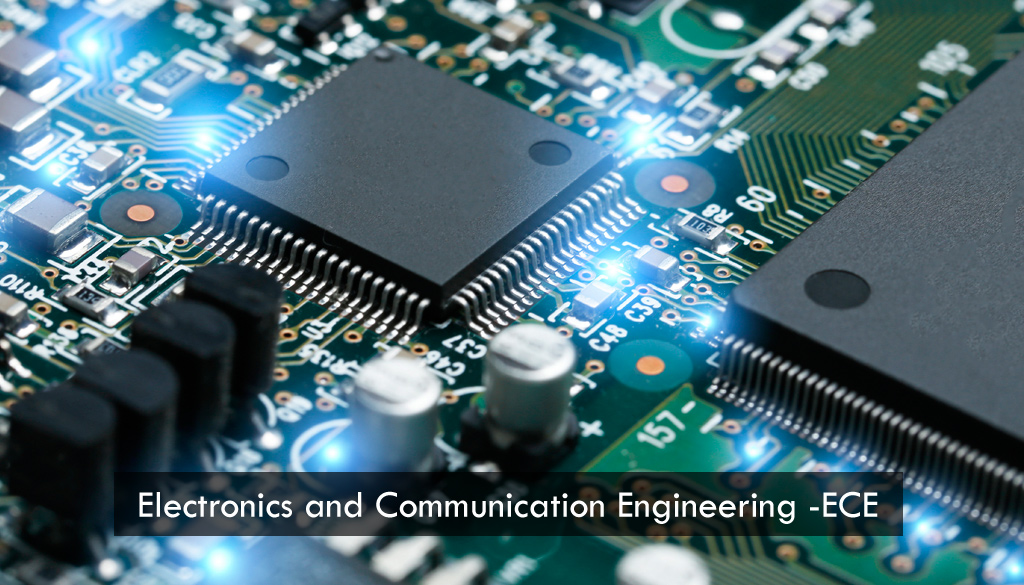
Electronics and Communication Engineering -ECE
Electronics and Communication Engineering is a field that focuses on designing electronic devices and circuits with the help of non-linear and active linear components. This is a thriving domain with a myriad of opportunities in store for students. With the contemporary technological advancements, there are numerous topics that one can study in this field, such as, Reception of data, Antenna and Wave Progression, the Internet of Things, etc. With the increasing digitization, the realm of ECE is also evolving, hence, a huge spectrum of opportunities is available in the field. It is one of the rapidly growing fields in engineering.
Courses in Electronics & Communication Engineering
To gain a formal understanding and gain a subject knowledge of ECE, a student can pursue a range of courses. The courses specializing in ECE are:
- B. Tech in Electronics and Communications Engineering
- B.Tech in Electronics Engineering
- M. Tech in Electronics Engineering
- M. Tech in Electronics and Communications Engineering
- Ph.D. in Electronics and Communications Engineering
- Diploma in Electronics and Communication Engineering
Along with the normal courses, these courses are also offered with specializations and in association with industry leaders.
Here is the list of ECE specializations that can you choose:
- VLSI Design
- Telecommunication Engineering
- Signal Processing
- Instrumentation Engineering
- Control Engineering
Benefits of studying ECE course
The expanse of ECE isn’t limited to only a particular industry. The world these days aims at developing products that are smaller, smarter, and multi-functioning. In the present times, industries associated with energy, defense, agriculture, economy rely on the field of ECE for sustenance. Almost every industry requires electronics for smooth functioning.
Defence, space, and other organizations employ electronics engineers for developing and designing systems and devices for telecommunication and signal processing. Specialization in various areas like VLSI design, embedded systems, signals, and systems, etc., gives electronics and communication engineers an edge.
Eligibility Criteria to get admission in ECE Course:
UG Course: Aspirants who have passed 10+2 examination with at least 50% marks in aggregate in 5 subjects are eligible to take admission in B.Tech ECE Course.
PG Course: Students who have scored minimum 50% Marks or equivalent CGPA in B.Tech.- Electronics & Communication Engg. / Telecommunication Engg./ Computer Science & Engg. / Information Technology/ Electronics & Instrumentation Engg. / Instrumentation & Control Engg. / Electrical & Electronics Engg. / Electrical Engg. / Biomedical Engg./Power Electronics or M.Sc. Electronics / Physics with Electronics as one of the subjects are eligible to take admission in M.Tech ECE.
Scope of ECE
Electronics has made tremendous advancements over the past few decades which can be seen in the following areas:
- Wireless communication like Bluetooth, GPRS, WiFi
- GPS Satellites
- Embedded Systems in Automobiles
- Barcodes
- Defense Applications like communication satellites, missiles, drones, etc.
Career Opportunities after ECE
mentioned, the opportunities in the ECE domain are ever-expanding. Therefore, every industry recruits ECE graduates. One can always choose to pursue a higher degree and develop a career in research or look for a job straight after graduation in ECE. Some industries that hire ECE graduates are:
- Electronics
- Automotive
- Healthcare Manufacturing
- Steel and Petroleum Industries
- Telecommunication Engineering
- Computer Networking
- Embedded System
- Robotics
- Defense
- Power Electronics
- Wireless Networking
Jobs after ECE
Considering the range of industries hiring ECE graduates, there is a wide range of jobs available in the field. Some of the job profiles available after completing B.Tech ECE are:
- Electronics Engineer
- Communications Engineer
- Technical Director
- Network Planning Engineer
- Desktop Support Engineer
- Electronics and Communication Consultant
- Customer Support Engineer
- Associate Firstline Technician
- Research and DeveloAs pment Engineer
- Field Test Engineer
- Electronics Device and Development Engineer
- Service Engineer
- Electronics Technician
- Electronics Design Engineer
Top Recruiters for ECE
Various stalwarts of the industry recruit ECE students and are always on the lookout for the same. Leading core companies recruiting ECE students are:
- Siemens
- Bajaj Electrical Ltd
- Wipro Lighting Corporate
- Microtek
- Tata Electric Company
- Adani Power Ltd
- Schnider Electric
- Havells
- Crompton Greaves
These are some of the many organizations that offer jobs after ECE courses.
Salary after ECE Degree
The average salary after completing the ECE course varies according to the job role. The salary range for freshers in private jobs after ECE is from 4.4 LPA to 7 LPA. Whereas, for the government jobs after ECE, the salary ranges between 2.7 LPA to 6 LPA.
ECE, being an evolving realm, is popular among individuals. Therefore, there is a wide spectrum of scope after an ECE degree. The career opportunities in ECE are always flourishing.



